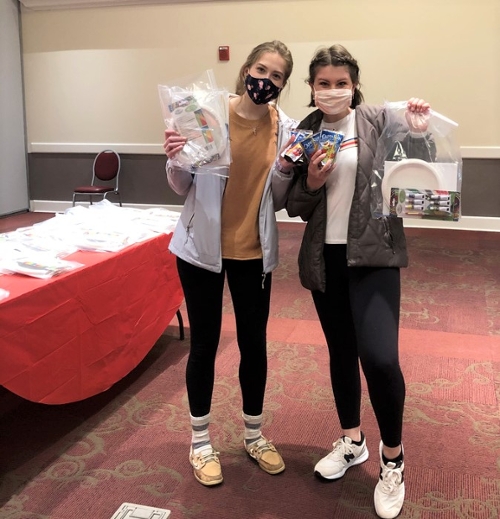Student Life Aims to Keep Some Pandemic Changes

In a year that demanded flexibility, creativity, and ingenuity, the Division of Student Life shifted programs and services to continue supporting students’ growth, learning, and success.
It was a year of innovation and resilience. As restrictions are lifted and vaccines become readily available, the division has taken stock of positive changes that emerged out of the pandemic. Some will continue long after the dust settles on the 2020-21 year.
Online Education and Training
Virtual programs became a central part of the student experience in 2020-21. While most programming will return to in-person experiences this fall, the division will maintain some virtual training and education options.
Student staff training. Some offices will continue offering virtual student staff training as needed to save costs, avoid time conflicts, and preserve staff time. “Our work is quite digital to begin with,” said Jen O’Brien, director of communication for student life. “Remote training allowed our student employees the opportunity to actually practice some of the systems they were learning. We’ll definitely use a hybrid model for training in the future.”
Orientation. Orientation for incoming students will return to in-person experiences next year. However, the Canvas course will continue to serve as a supplemental resource. Previously, some content could not be thoroughly covered during in-person orientation due to time constraints. The modules will be available for reference throughout the entire year.
Podcasts. The pandemic spurred the launch of two Student Life podcasts to reach students in a new way. The We Need to Talk podcast discusses challenges impacting the campus community. The Love, Honor & Culture podcast covers diverse student issues at Miami.
Sustained and Deepened Relationships
Through the pandemic, staff found ways to extend and deepen relationships with multiple groups.
Student orientation undergraduate leaders (SOULS). Incoming students will have expanded opportunities to connect with current students in a mentor-like relationship. The SOUL position will now extend through the summer to allow sustained contact, rather than ending in June.
Family Q&As. Parents and family members of incoming students will be able to attend virtual Q&A sessions in July and August after traditional in-person orientation, as well as into the academic year.
Student organization advisors. Advisors developed meaningful, regular connections with organization members through virtual meetings this year. "We were encouraging virtual meetings specifically for fraternity chapters prior to the pandemic," said Kim Vance, director of the Center for Student Engagement, Activities, and Leadership. "COVID pushed us to operate this way and now students and advisors see the effectiveness."
Vance predicts some student organizations will continue some meetings virtually. "Through Zoom, students who are studying abroad or restricted in mobility can still engage and be active with their peers. It also allows meetings to be held over the summer and during bad weather."
Increased Access to Services and Support
Through the pandemic, the division removed barriers and increased access to services and programs. Many units will now offer choice and flexibility for students engaging in these experiences.
Telebehavioral health. Students will continue to have access to telebehavioral health for some appointments (including individual and group counseling), pending counselor availability and clinical needs.
Academic support. Students seeking tutoring and academic counseling will be able to decide the best format for them.
“We have witnessed great successes with our ability to provide remote academic coaching and academic counseling,” said Christina Carrubba-Whetstine, director of the Rinella Learning Center. “Our ‘no-show’ numbers have become almost non-existent.”
Support for students with disabilities. Students will be able to complete virtual access consultations with the Miller Center for Student Disability Services.
Programming: Format and Focus
 Grab and go program "Capris & Canvases" held in February.Focus on wellness. It’s no surprise that topics related to health and wellness were top of mind this year. The division will continue conversations about disease prevention and response and capitalize on the focus on wellness in future programming, widening the scope beyond COVID-19.
Grab and go program "Capris & Canvases" held in February.Focus on wellness. It’s no surprise that topics related to health and wellness were top of mind this year. The division will continue conversations about disease prevention and response and capitalize on the focus on wellness in future programming, widening the scope beyond COVID-19.
Grab and go activities. Grab and go activities became a staple of hybrid in-person/virtual programs and will continue. Students pick up supplies and can gather in person or participate in a virtual option. Grab and go programs provide flexibility for students and reduce the need for a large space or a specific facility.
Mega Fair. While Mega Fair will return to an in-person experience, there will be an effort to spread it over a larger time period or location to avoid tightly-packed large gatherings.
Looking Forward
The lessons learned, partnerships forged, and solutions created over the past year have paved the way for lasting positive impacts. Some events, programs and services will return to pre-pandemic formats. Others will embrace successful pandemic changes to better serve Miami students. One constant will remain. The division of student life will continue evolving to support students' growth, learning, and success.

